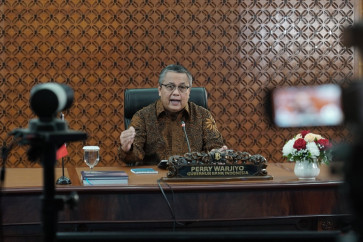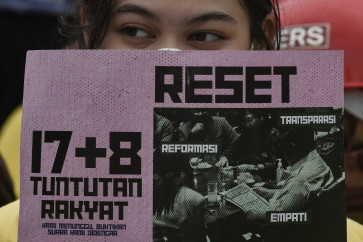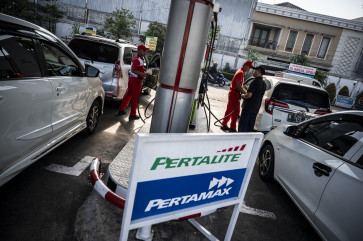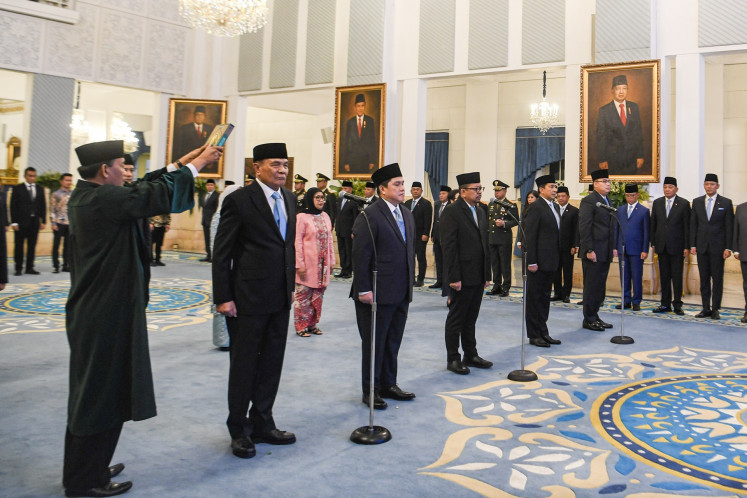Popular Reads
Top Results
Can't find what you're looking for?
View all search resultsPopular Reads
Top Results
Can't find what you're looking for?
View all search resultsIndonesia urged to stick by net-zero emissions target
The government has continued to rely on coal as the country’s primary energy supply in the past years.
Change text size
Gift Premium Articles
to Anyone
E
xperts have urged Indonesia, which is heavily reliant on coal for power generation, to stop relying on coal and other fossil fuels to support the global and its own net-zero emissions target and prevent the ongoing climate crisis from worsening.
The government has continued to rely on coal as the country’s primary energy supply in the past years, experts highlighted. They argued that the government had been gravely undermining the impact of coal’s usage on the ongoing anthropogenic climate crisis.
Their call came ahead of a climate summit hosted by United States President Joe Biden on Thursday and Friday. The summit aims to raise the world leader’s ambitions in mitigating the climate crisis. Forty leaders were invited to attend, including President Joko “Jokowi” Widodo.
Tri Mumpuni Iskandar, director of the non-profit People Centered Economic and Business Institute (IBEKA), highlighted Jokowi’s flagship 35,000-megawatt (MW) electricity program. The project is relying on coal and projected to use 200 million tons of the commodity every year.
“Why do we have to boost electricity use with dirty energy? We can instead use microhydro, wind and geothermal power plants,” Tri said during a virtual discussion held by the Foreign Policy Community of Indonesia (FPCI) on Tuesday.
Read also: RI to break long-term green energy promises at current pace: IESR
Coal made up 37 percent of the country’s energy consumption in 2019, followed by oil (34 percent) and gas (20 percent). Meanwhile, renewables only contributed around 9 percent to the country’s energy mix that year.
The latest National General Energy Planning (RUEN) road map stipulates that renewables should make up 31 percent of the mix by 2050. But the road map still specifies that the government will use coal to fulfill 25 percent of the national energy needs that year.
Burning coal for fuel emits carbon dioxide and other greenhouse gases that contribute to the rise of the planet’s temperature, according to the US Energy Information Administration.
The experts’ call echoed a similar appeal made on Monday by US Secretary of State Antony Blinken, who said the US would press all countries to reduce reliance on coal while also raising its own efforts on the matter.
“When countries continue to rely on coal for a significant amount of their energy, invest in new coal factories or allow for massive deforestation, they will hear from the United States and our partners about how harmful these actions are,” Blinken said in a speech.
Every country that signed the Paris climate agreement in 2015 is required to increase its ambition to limit global warming to below 1.5 or 2 degrees Celsius. Recent studies even suggest that the countries will need to be more ambitious by reaching a net-zero emissions target for all greenhouse gas emissions by 2068.
But Indonesia has decided to keep its previous climate pledge of a 29 percent reduction in greenhouse gas emissions independently, or a 41 percent reduction with international assistance, by 2030. Indonesia is also mulling over the option to adopt a net-zero emissions target by 2070 — two years after the deadline suggested by the studies.
The World Resources Institute (WRI) defines net-zero emissions as the point when human-caused greenhouse gas emissions are balanced out by removing the gasses from the atmosphere. This process will take place after countries reduce their emissions to as close to zero as possible.
The government has argued that the 2070 target was the most realistic for Indonesia based on several models tested, as the archipelago would need to maintain its economic growth at 5 to 7 percent.
Tata Mustasya of Greenpeace Indonesia said Indonesia should phase out coal usage and start increasing its use of renewable energy to reach the net-zero emissions target.
“There won’t be a Golden Indonesia in 2045, our 100th anniversary of independence, if coal is still dominating our energy use,” Tata said.
He urged the government to issue a moratorium on the construction of coal and gas power plants and push for 50 percent renewable energy usage in the national energy mix.
Read also: Indonesia’s net-zero climate goal lags behind
National Development Planning Agency (Bappenas) head Suharso Monoarfa acknowledged the need for the country to be more ambitious and work as soon as possible to reach the desired net-zero emissions target. He added that Indonesia would need to shift to a greener development approach immediately.
“Delaying the shift for another year will delay us from reaching the target for another five to 10 years,” Suharso said during the event.
He also urged all stakeholders to help the country achieve its low-carbon and sustainable mid-term national development plan by promoting green businesses and investments.
Achieving the development target would not only reduce greenhouse gas emissions but also “help the country escape the middle-income trap”, Suharso went on to say.
According to projection studies by Bappenas, the green economy and low carbon scenario will help Indonesia increase its economic growth by 2 percent by 2045.
Suharso said Bappenas had handed over the studies to President Jokowi, who will eventually decide which scenario the country would use to cut greenhouse gas emissions.










